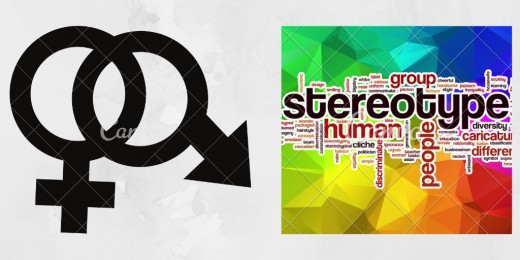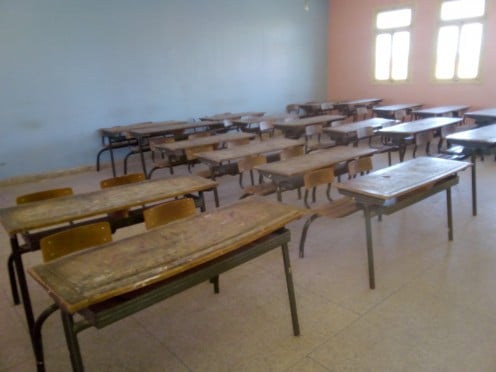Theft in the classroom

1. The teacher's accusation to the cruelest students.
He
checked all his pockets and desk. He did not find anything. He went to
and fro between the tables like he was crazy. Nobody knew what had
happened to him. He gazed at me. “I’m sure that you’ve stolen my phone”
he accused me. I thought he accused me directly in that I was the
cruelest and the stupidest student in the class. His accusation against
me was really wrong since he had no evidence. Yes, it is very easy to
accuse someone, but it is very hard to find true proofs. “What phone
I’ve stolen? It’s not me. You can check me if you don’t believe” I
defended my self. But, he did not believe me “it’s you…it’s you…it’s
you” he assured.
It was really very hard to convince him since he had some prejudgments about me. I wondered why he did not check all my class mates before to accuse me. That really proved he only hated me. Even though I was the cruelest and the stupidest student, I liked him so much since he was my teacher. "To be cruel or stupid or to be both of them, it does not mean to be a thief. It is really a wrong equation. I do not judge someone before to know about him. I really do not accuse anyone when I do not have true proofs. Accusing someone without true evidences is really a true crime".
All my class mates were silent and they were only observing what was going on between me and the teacher. He checked me. He only found some dates in my pocket and bread with cheese in my book bag. He was disappointed and his face became reddish. “Where have you put my phone?” he asked me with a very strong voice. “You’ve just checked me. How dare you accuse me in this way? It’s not fair and I won’t accept this” I complained. He gazed at me aggressively and he said “there is only one way by which I can get back my phone. It’s punishment”. Then, he went out towards the principal’s office. Everybody was extremely eager to know what sort of punishment would be inflicted on me. It was really a good moment of suspense to all the students.
It was really very hard to convince him since he had some prejudgments about me. I wondered why he did not check all my class mates before to accuse me. That really proved he only hated me. Even though I was the cruelest and the stupidest student, I liked him so much since he was my teacher. "To be cruel or stupid or to be both of them, it does not mean to be a thief. It is really a wrong equation. I do not judge someone before to know about him. I really do not accuse anyone when I do not have true proofs. Accusing someone without true evidences is really a true crime".
All my class mates were silent and they were only observing what was going on between me and the teacher. He checked me. He only found some dates in my pocket and bread with cheese in my book bag. He was disappointed and his face became reddish. “Where have you put my phone?” he asked me with a very strong voice. “You’ve just checked me. How dare you accuse me in this way? It’s not fair and I won’t accept this” I complained. He gazed at me aggressively and he said “there is only one way by which I can get back my phone. It’s punishment”. Then, he went out towards the principal’s office. Everybody was extremely eager to know what sort of punishment would be inflicted on me. It was really a good moment of suspense to all the students.
2. The Teacher, the principle, and the cruelest Student
On
their way towards the class, the teacher and the principal were
discussing the matter. Some students were afraid like they had stolen
the teacher’s phone. Unlike them, I was confident since I had not stolen
it and the teacher could not prove his accusation against me. It was
only a deliberate accusation. “Why have you stolen the phone of your
teacher?” the principal asked me “please, give it back to him” he added
politely. “I’m innocent. I’ve never stolen in my life. I wonder why I’ve
been charged among forty five students in the class” I proved to him.
“Yes, you’re right. There are really forty five students in the class”
he confirmed. “Have you checked all the students?” he asked the teacher.
“Not yet” the teacher replied in a very low vice. “It’s not fair to
accuse Ali before to check all the students. You have really done a big
mistake. Check them now” the principal blamed and ordered the teacher.
3. The Teacher, the best Student, and the principle.
While
the teacher was checking all the students one by one, I saw a student
who sat in front of the teacher’s desk was shivering and sweating. It
seemed that it was him who had stolen the phone. I was only waiting for
the moment when the teacher would check him. But, I couldn’t wait. The
suspense was really killing me. His turn came then. The teacher checked
him and found the phone in the bottom of his book bag wrapping it in a
handkerchief. “Why have you done this? And how have you done this?” the
teacher asked that student. But, this latter did not answer. The teacher
could not believe that his beloved student was a thief. All the
students were surprised too to see the most polite and the best student
became a thief.
“You’ve really done a big mistake. You should have checked all the students before to accuse Ali” the principal blamed the teacher again. The teacher was shivering like he was the thief. He was confused and did not know what to say to the principal. “Ali, come here” the principal ordered me and I obeyed him. “You should know that all people make mistakes. Human being in general isn’t angel. It’s now clear that you aren’t a thief, and I want you to forgive your teacher. I’m sure that he’ll love you after that” he persuaded me. I obeyed him again and I forgave my teacher. Everybody was happy that moment except that one who had stolen the phone. The principal looked at him sorrowfully. “I know that you’re a good student, but what you only need is to apologize to your teacher. I want you to do now” the principal ordered him. He really apologized to the teacher, and this latter forgave him. Everybody was happy again, but without exception.
“You’ve really done a big mistake. You should have checked all the students before to accuse Ali” the principal blamed the teacher again. The teacher was shivering like he was the thief. He was confused and did not know what to say to the principal. “Ali, come here” the principal ordered me and I obeyed him. “You should know that all people make mistakes. Human being in general isn’t angel. It’s now clear that you aren’t a thief, and I want you to forgive your teacher. I’m sure that he’ll love you after that” he persuaded me. I obeyed him again and I forgave my teacher. Everybody was happy that moment except that one who had stolen the phone. The principal looked at him sorrowfully. “I know that you’re a good student, but what you only need is to apologize to your teacher. I want you to do now” the principal ordered him. He really apologized to the teacher, and this latter forgave him. Everybody was happy again, but without exception.
BY: ABDELMAJID YAQOUBY
26/06/2005
26/06/2005










 Culture
is defined as “the integrated pattern of human knowledge, belief, and
behavior. Culture thus defined, consists of language, ideas, beliefs,
customs, taboos, codes, institutions, tools, techniques, works of art,
rituals, ceremonies and other related components” (Britannica 1998:784
vol.3). In another point of view, Hunt and Horton (1964:52) consider
culture as a “system of behavior shared by the members of society”, that
is to say, culture is the basic element which fortifies and unifies the
relations among the members of society. In other words, the culture is
the constructor of society since the unity of this latter bases on a set
of shared beliefs, customs, values and other activities. So, the
absence of a shared culture entails the absence of society absolutely.
Culture
is defined as “the integrated pattern of human knowledge, belief, and
behavior. Culture thus defined, consists of language, ideas, beliefs,
customs, taboos, codes, institutions, tools, techniques, works of art,
rituals, ceremonies and other related components” (Britannica 1998:784
vol.3). In another point of view, Hunt and Horton (1964:52) consider
culture as a “system of behavior shared by the members of society”, that
is to say, culture is the basic element which fortifies and unifies the
relations among the members of society. In other words, the culture is
the constructor of society since the unity of this latter bases on a set
of shared beliefs, customs, values and other activities. So, the
absence of a shared culture entails the absence of society absolutely.









